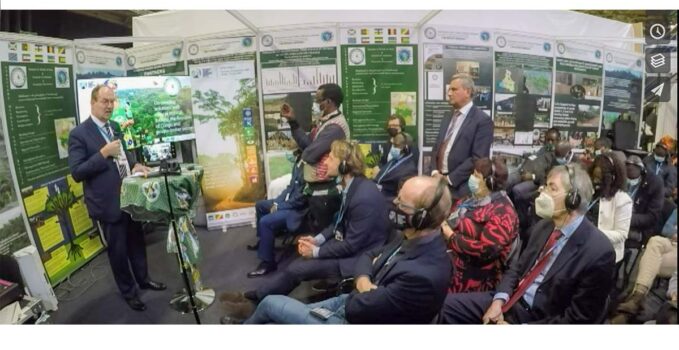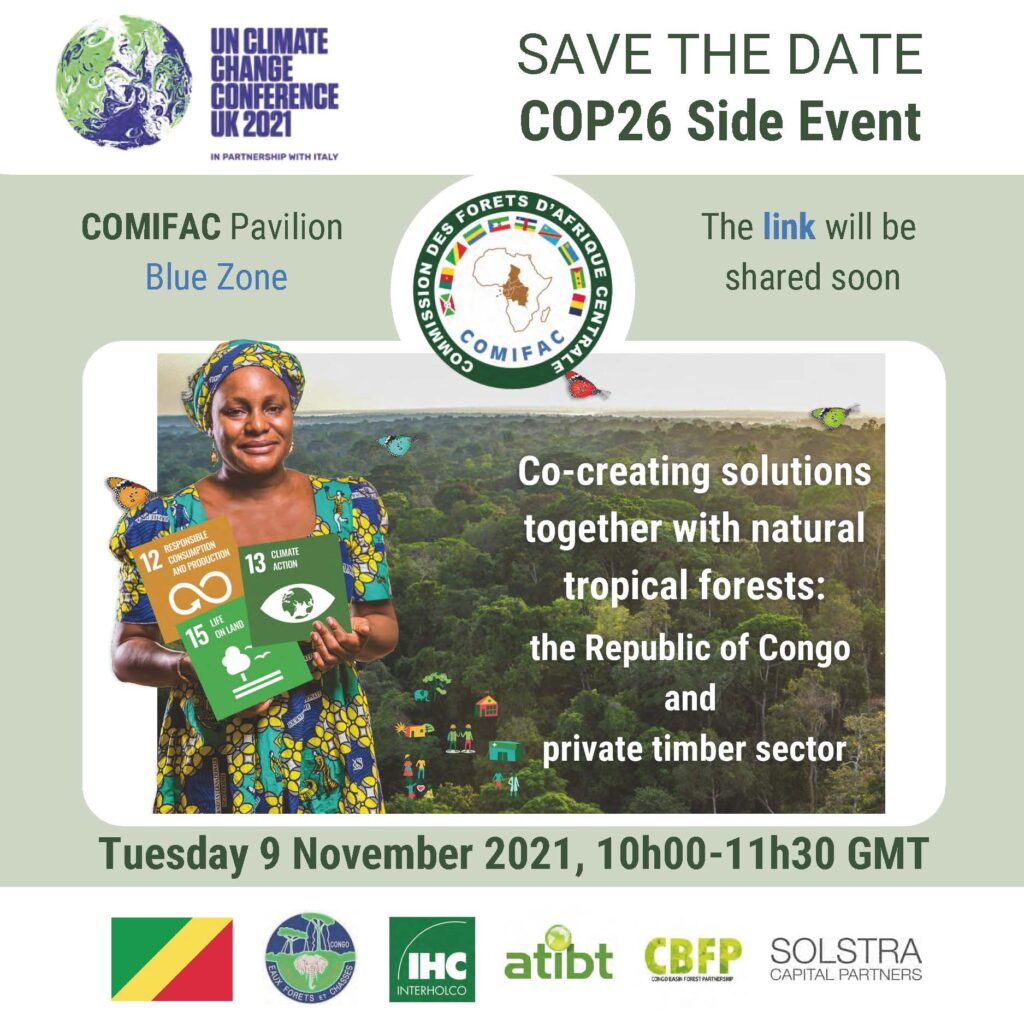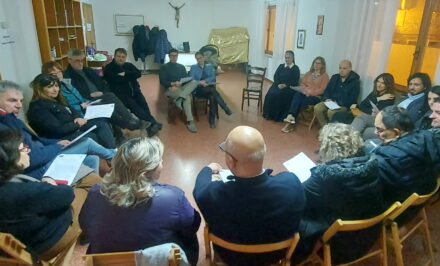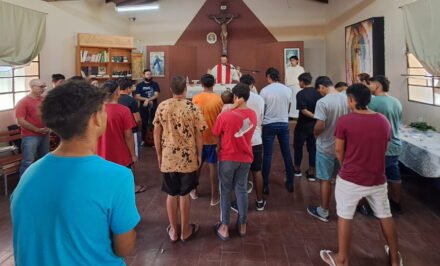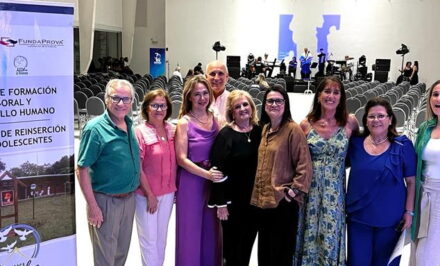WORLD CLIMATE SUMMIT, Ulrich Grauert / Maria Fischer •
Tuesday 9, 2021, Swiss Interholco AG has organized a side-event in Glasgow at the World Climate Summit with the intention to demonstrate the synergy between the Congolese state and private sector (FSC-certified timber industry) aimed at effectively maintaining a forest area whose inhabitants and biodiversity are sensitive to climate change. Interholco CEO Ulrich Grauert, Schoenstatt member and Founder of IKAF (International Kentenich Academy for entrepreneurs and leaders), shares his presentation with the users of schoenstatt.org. —
In the context of World Climate Summit – and with Laudato Si and Covenant Culture inside – he exhibited a proven management model which provides responsibly produced timber products for the local and international wood markets. A wide range of co -products are further delivered, i.e. equitable employment, fighting poverty, access to essential quality services (healthcare, drinking water, housing, electricity, schools, etc.) for thousands of employees and their families in one of the most landlocked areas of Congo as well as carbon absorption, biodiversity protection and climate change mitigation on a global scale.
INTERHOLCO: responsibly produced wood in the Republic of Congo – caring for climate and beyond
Your excellencies, ladies and gentlemen – not only here in the room, but also those being with us online,
The COVID-19 pandemic has shown us how devastating a global and cross-border impact can be. Climate change and biodiversity loss, however, are no different and pose in fact an even greater existential threat to the people on this planet.
As INTERHOLCO we are aware of this situation and do take our part of the responsibility. We are foresters by heart, and we are working in natural tropical forests in the Congo Basin in Africa.
We’d like to share some insights into the work we daily do.
INTERHOLCO is a leading international producer and supplier of hardwood from Africa. Headquarters are based in Switzerland and our production site is in the North of the Republic of Congo Brazzaville.
We take care of the whole value chain. From selective forest harvesting operations until final delivery to customers in 40 countries world-wide, including a wood-processing industry with several production units.
All our own production is 100% FSC certified, and we manage a forest area of 1,16 Mio. hectares of contiguous forests; the largest single certified forest concession in the tropics world-wide.
At INTERHOLCO, we believe the world needs healthy and sustainably managed forests.
This is important for our about 1’000 employees, meaning: job opportunities, health care for workers and their families, as well as the possibility to acquire skills and develop talents.
Healthy forests are also important to the local region, in which we work and live. Local development for about 16’000 people or more, depends on this forest area, considering infrastructure, health care through our local hospital, clean drinking water or school availability.
For indigenous peoples, healthy forests mean the ability to continue using trees for medicinal needs. Forests for needed livelihoods and identity remain intact, and people can continue exercising their traditional rights, including hunting.
With a strong unit of Eco-guards and in partnership with the government and local and international NGO’s we implement strong anti-poaching measures on the ground to safeguard gorillas, elephants and many more wildlife species. Scientific studies show proof of its effectiveness.
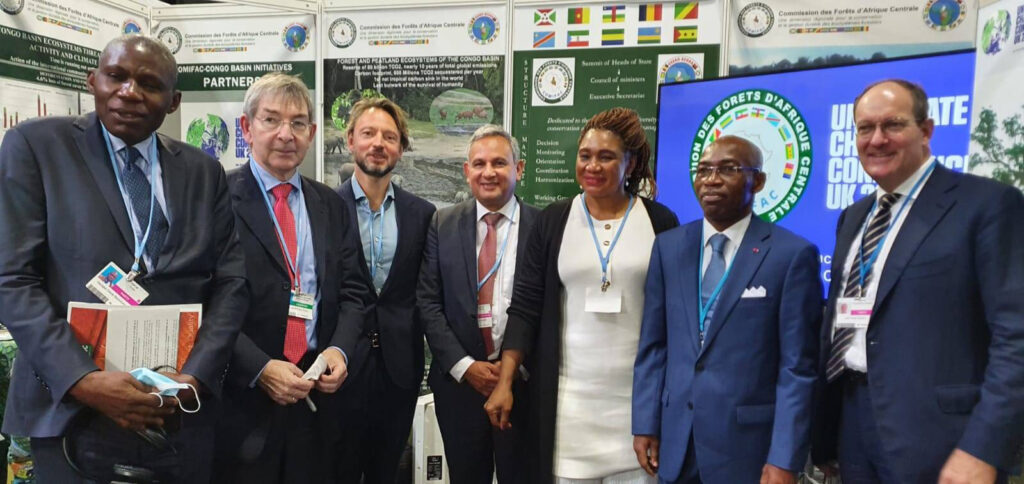
From left to right: Mr. Georges Boundzanga, Dr. Christian Ruck, Dr. Oscar Crohn, Mr. Olman Serrano, H.E. Minister Rosalie Matondo, H.E. Minister Ndongo, Mr. Ulrich Grauert
But we also have a “second forest”.
This forest is in urban cities and communities all over the world. The wood we produce, is ‘our second forest’.
It is in housing, construction, flooring, window-frames, furniture, terrasses, bridges and many more. They also serve as carbon sinks.
Wood is one of the best building materials we can think of. It is fully bio and combustible. It shows inherent strength for the need of static in construction and, wood is very fire-resistant, much needed in building construction.
Wood is one of the very few building materials that can give proof to come from renewable sources. This gives lots of advantage over concrete or steel.
Also, wood is just beautiful. It is nice to touch and always keeps us in a good atmosphere, be it outside in the forest or inside in living areas.
So how do we do it?
Good governance makes this possible and certification plays a key role in it. Certification (FSC or PEFC) stands for a global community co-shaping the criteria that allow independent audits to verify that forests are well protected. The ecological functionality for water, climate and biodiversity is preserved. Doing this, we contribute to the UN Sustainable Development Goals.
Our performance and intentions are all about “acting together”. We need a COVENANT CULTURE, an ALLIANCE, and we need to do things together, because things are way too complex, and single sector activities cannot bring the solutions urgently needed.
At this point I also want to express my deepest gratitude to our employees and their efforts being made, especially in these difficult COVID-times. They are doing a great job!
We need this ALLIANCE also between the private sector and its governments, same as between the private sector and investors, with end-users – who finally decide what to buy -, with development financial institutions, NGO’s, scientific institutions, local communities and of course with customers and suppliers.
We need the whole industry and private sector pulling into the same direction.
The private sector can speed up timelines dramatically when everyone agrees on the direction. A much more direct interaction with the private sector is needed. And we need to facilitate the alignment of financial flows with international goals.
Private sector investments need to be aligned behind industry strategies to help finance the transition efforts. There is absolutely no doubt in my mind that the private sector is ready to play its part and to find a way forward. We need to find practical ways of overcoming differences and facilitate an increase in finance and investment.
The growing recognition of the role that Africa’s forests play in climate regulation, is now translating into actions which can bring much needed economic benefits to local communities for whom these forests are home.
As one consequence of our joint efforts, INTERHOLCO will be bringing a package of carbon offset credits to market in 2022. This climate finance will flow back to all stakeholders including local communities and indigenous peoples.
The economic growth of private sector investments into tropical forests, translate locally into funds for communities, taxes to government and support in key infrastructure. The needs of employees and their communities feed a regional and sub-regional market of food, services, transport, and supplies. Regional markets need urgent development in lesser developed countries.
Certified hardwood from Africa empowers consumers and investors to co-create the much-needed change.
Wood from certified African forests is part of the solution and well positioned for this challenge.
Wood has a future because the future cannot do without wood.
Thank you!
Video Recording
Press Release
Photo Credit: Interholco Press Release


